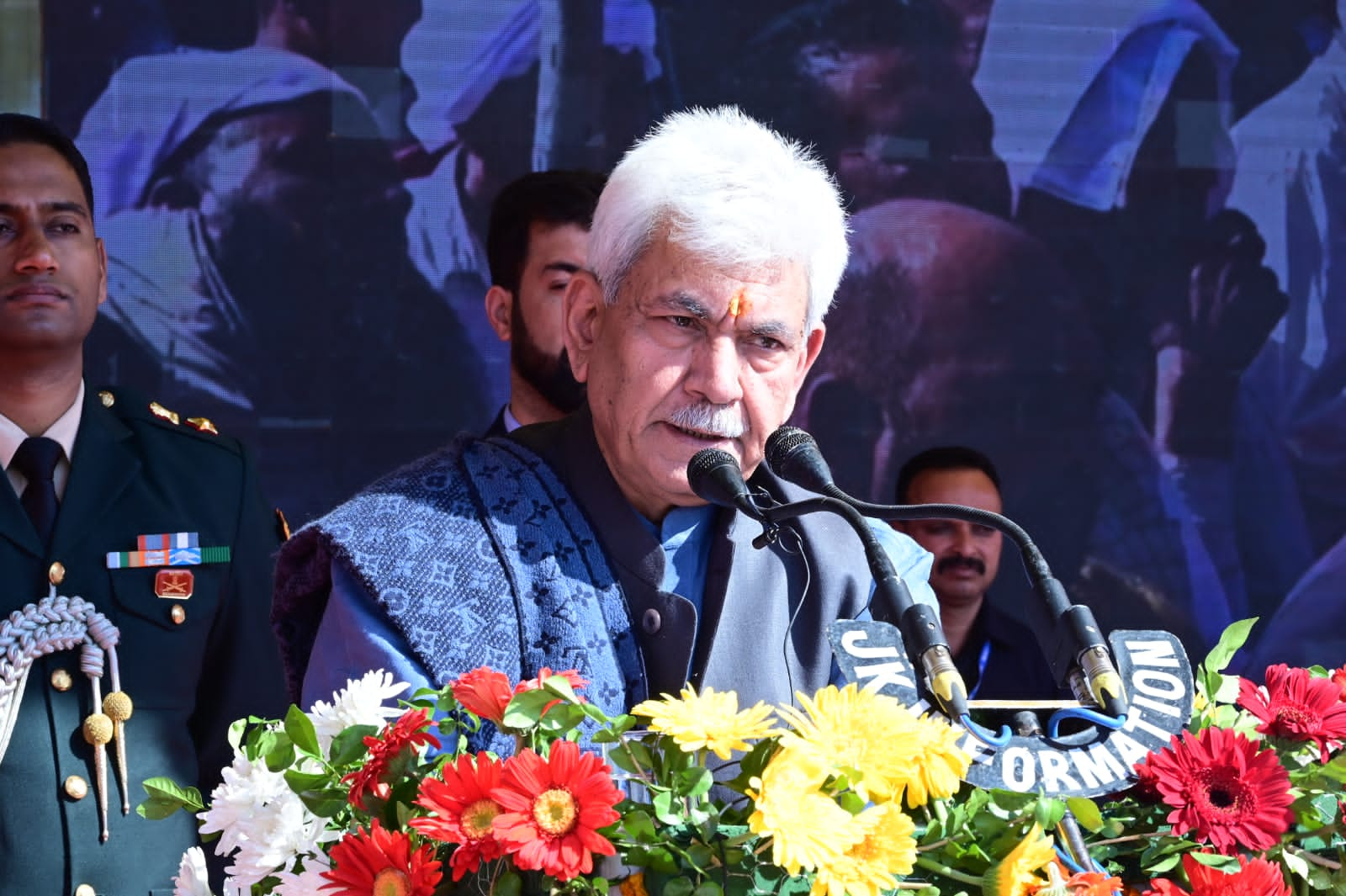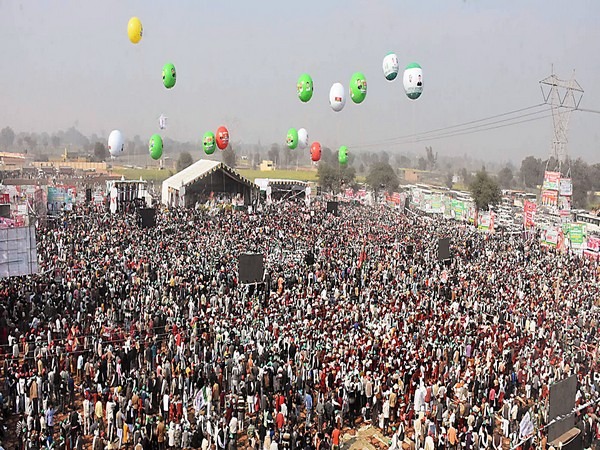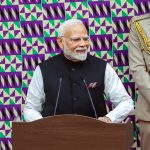Jammu, November 29:Lieutenant Governor Manoj Sinha launched key initiatives of National Education Policy-2020 today at an event held at Padma Shri Padma Sachdev Government PG College for Women, Gandhi Nagar.
Highlighting the transformation taking place in the education sector under the leadership ofPrime Minister Narendra Modi, LG Sinha said: The future higher education & learning will be more dynamic, adaptable and personalized like a liquid learning model platform to seamlessly blend the ideas from different disciplines to prepare students for varied & comprehensive knowledge in rapidly shifting world.
National Education Policy will play a significant role in making India a Knowledge super power. Since, the government educational institutions are equipped with requisite tools and resources at par with private institutions, we need to assess our national and global ranking and take corrective measures, observed the Lt Governor.
The Lt Governor also emphasized that Teachers-Students need to capitalize on the advances in Science & Humanities for reorganizing classrooms and working world experience with focus largely on research and values that provide with skills and knowledge relevant for today and tomorrow.
In order to supplement the successful implementation of NEP-2020 in a paperless mode, various digital initiatives have been launched such as, e-Samarth portal, feedback portal, Biometric attendance portal, Sparrow portal, and Annual Transfer Portal to bring transparency and accountability in the department.
The Lt Governor underlined that Inter-disciplinary curriculum and multi-disciplinary education are at the heart of National Education policy to train future innovators and leaders.
Environmental, scientific, technological transformation & globalisation has increased the pace of socio-economic changes. Problem-based learning will make the students familiar with real-world situations & develop thinking and creativity skills,” the Lt Governor said.
The recommendations implemented in UG Program of all the colleges from 2022-23 session will bridge the gap between theoretical knowledge and practical skills, provide resources and choice for research and flexibility in completing degree programme, the Lt Governor further added.
National Education Policy promotes collaborations between disciplines to foster innovation and creativity. In future sustainable technological advances will be driven by people having an interdisciplinary approach, he added.
The Lt Governor stressed on developing future-oriented skills among the youth, promoting research and strengthening the academia-industry relationship.
Degree Colleges shall be encouraged to start the skill development courses identified from the skill sector council under the National Skills Qualification Framework (NSQF). These courses shall be taught in partnership with industry where component of 12 credits taught by the College as professional knowledge and the component of 18 credits taken as professional training from industry. In the initial stage, 50 colleges have been identified to start the skill development courses, the Lt Governor said.
The Lt Governor asked the teachers and faculty members to promote the startup ecosystem in Higher Education. He further called upon students to nurture critical thinking.
Speaking on the occasion, Rajeev Rai Bhatnagar, Advisor to Lt Governor, highlighted the need for effective utilization of all the resources for preparing the youth to be future leaders.
Dr Arun Kumar Mehta, Chief Secretary entrusted upon the Educational institutions to empower the students through education and providing them with skills training and advanced learning to adapt to the dynamic needs of the job market. He also called upon the universities to regularly engage in course content revision. J&K will be among the front runners in implementing NEP 2020, right from kindergarten to providing PhDs, he added.
Rohit Kansal, Principal Secretary to the Government, Higher Education Department highlighted the steps taken by the Higher Education department towards implementation of NEP-2020. He also spoke on the key features of initiatives launched today.
The occasion also witnessed signing of MoUs between J&K’s Higher Education Department with SKUAST-Jammu, SKUAST Kashmir, Jammu University, Kashmir University for sharing of agro based skills, and research based knowledge, life skills courses and mentoring of colleges respectively, to better equip the students.
The Lt Governor launched a book on “Implementing National Education Policy”. Principals of different Colleges were felicitated by the Lt Governor for getting NAAC accreditation.
On the occasion, impressive cultural performances were showcased by local artists highlighting the rich culture and heritage of Jammu Kashmir.
Prof. Ravinder Kumar Sinha, VC, SMVDU; Prof. Nilofar Khan, VC, University of Kashmir; Dr J.P. Sharma, VC, SKUAST-J; Prof. Nazir Ahmad Ganai, VC, SKUAST-K; Prof Bechan Lal, VC, Cluster University Jammu; Dr. YasmeenAshai, Director Colleges; Prof. Minu Mahajan, Principal PSPS Govt. PG College for Women, Gandhi Nagar; HoDs, principals of various colleges and students in large numbers were present during the launching ceremony.
AC approves HR Policy for AWWs & Helpers
As a major step towards the empowerment of women in the UT, the Administrative Council (AC), which met here under the chairmanship of the Lieutenant Governor, Manoj Sinha, approved the HR policy for female Anganwadi Workers (AWWs) and Helpers working in the Integrated Child Development Scheme (ICDS) of J&K.
Rajeev Rai Bhatnagar, Advisor to the Lieutenant Governor, Dr. Arun Kumar Mehta, Chief Secretary, J&K attended the meeting.
The Administrative Council approved the proposal of comprehensive Human Resource Policy to govern the engagement, leave(s), promotion and other important aspects of this very vital work force of the department.
AWWs and AWHs shall be re-designated as Sanginis (AWWs) and Sahayikas (AWHs). The unit for selection has also been re-defined in terms of electoral ward to remove any ambiguity in the selection process. The new policy also clearly lays down age criteria for selection, with domicile of UT being pre-requisite eligibility for competing in the selection process. The Minimum qualification for Aanganwadi Worker shall be 10+2 and maximum graduation and in case no 10+2 candidate is available in the Ward, 10+2 pass candidate from the adjoining ward shall be considered which would require prior approval of Mission Director, ICDS. Weightage shall be given to marks obtained in 10+2 and selection shall be done purely on merit basis. Candidates with qualification higher than graduation shall not be considered.
For selection as Anganwadi Helper, minimum qualification shall be Matriculation. The new HR policy also stipulates the quantum of leave, eligibility for training/capacity building and process for termination of services.
The services of both AWW/AWH shall end on attaining the age of 60 years and vacancy so arisen, shall be filled as per prescribed procedure. Moreover, if the AWW/AWH, after engagement, permanently shifts/changes her place of residence outside the Ward on the basis of residence of which, she was selected, then she shall be deemed to have been disengaged from the post of AWW/AWH and the vacancy so accrued shall be filled as per the stated procedure.
Land transfer for public purposes approved
The Administrative Council (AC) which met here under the chairmanship of the Lieutenant Governor, Manoj Sinha, approved the proposals of different departments for transfer of land for various developmental projects.
Rajeev Rai Bhatnagar, Advisor to the Lieutenant Governor, Dr. Arun Kumar Mehta, Chief Secretary, J&K attended the meeting.
The Administrative Council approved the proposal for transferring State (MehfoozKahcharie) land measuring 60 Kanal situated at village Badala, Tehsil & District Kathua in favour of Skill Development Department for establishment of Polytechnic College.
The Polytechnic College in District Kathua shall provide opportunity to youth of the area to get technical education in different streams and would thus serve an important public purpose.
The Administrative Council also transferred State land measuring 17 Kanal 15 Marla situated at Bhajmasta, Tehsil & District Ramban in favour of Northern Railways for construction of re-aligned portion of approach road from Digdole to Bhajmasta.
It would simultaneously enhance the connectivity to Tunnel T-49 from NH-44 and will cater to the needs of local villagers of Bhajmasta, Urnihal and nearby villages.
Lt Governor chairs review meeting of PDD
Lieutenant Governor Manoj Sinha chaired a review meeting of the Power Development Department today at the Civil Secretariat.
The meeting discussed various measures for enhancing sustainability, resilience and efficiency of the power sector and steps to achieve targets to reduce AT&C losses.
Issuing directions to the PDD officers present in the meeting, the Lt Governor said that monitoring mechanism of power projects should be strengthened to meet the energy goals and aspirations of the people and businesses.
“We need to have multi-pronged strategy for energy security and decisions taken during winter preparedness meetings should be followed in letter and spirit, he further said.
The Lt Governor impressed on the Department to address the problems of common man with seriousness and commitment.
During the meeting, the Lt Governor sought the status of the steps taken to meet power demand; required energy and peak availability; demand-supply deficit, status of ongoing projects; implementation of the short-term, medium term and long-term action plans.
Earlier, H. Rajesh Prasad, Principal Secretary, Power Development Department gave a detailed presentation on the power scenario of Jammu Kashmir.
Dr Arun Kumar Mehta, Chief Secretary; Dr RP Singh, Chairman JKPCL; Sh. Jagmohan Sharma, Chairman JPDCL; Sh. Shiv Anant Tayal, Managing Director, JPDCL; Ch. Mohd. Yasin, Managing Director, KPDCL, besides senior officers of Power Development Department and Power Distribution Corporations were present.








